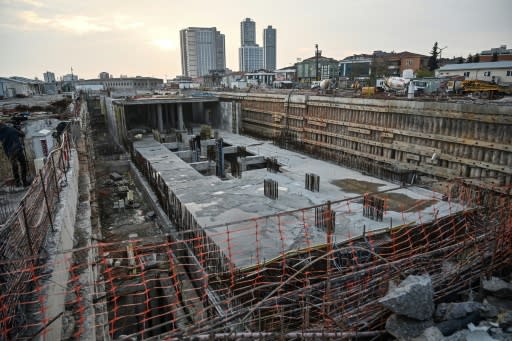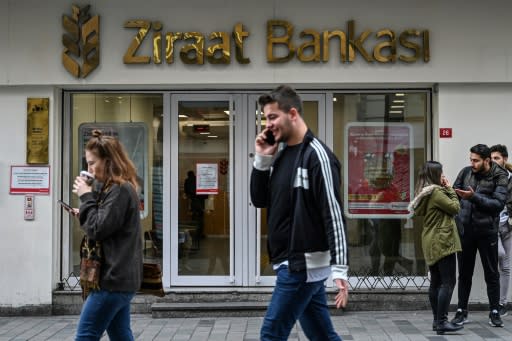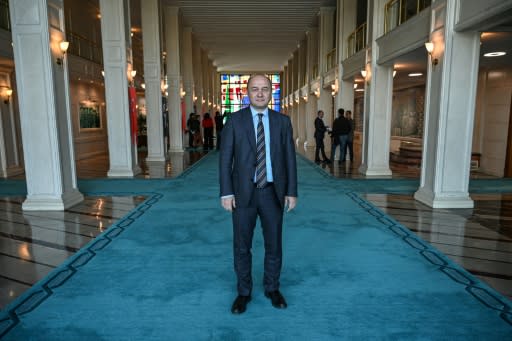Istanbul opposition mayor faces financial squeeze
At a half-built metro stop on the outskirts of Istanbul, the diggers have been idle for months, dozens of workers waiting day after day with nothing to do. The new 550-million-euro ($610 million) metro line, started in 2016, was due to connect outlying suburbs on the Asian side of the city to the ferries and sealines in the centre, but has been stalled as the municipality struggles to raise funding. There were already problems last year, when a currency crash and brief recession hit lenders. But now the problem appears to be political. In March, Istanbul fell to the opposition -- the first time that President Recep Tayyip Erdogan's religious conservatives had lost power in the city in a quarter-century. The new administration under Mayor Ekrem Imamoglu, of the secular Republican People's Party (CHP), claims Turkish state banks are refusing to finance major investment projects -- and blame pressure from Erdogan's government in Ankara. "We have seen loans are not given even to fund our daily needs," Imamoglu told reporters last month. "I believe this is a result of the psychological impact of (the ruling party) losing its 25-year rule. I still have the faith that this stance and behaviour will change." Erdogan does not want Imamoglu to emulate the success he himself enjoyed as mayor of Istanbul in the 1990s, which propelled him to the leadership of the country, said Anthony Skinner of risk assessment firm Verisk Maplecroft. "By refusing to extend loans to the municipality, state banks -- which provide approximately 40 percent of all loans and deposits in Turkey -- are seeking to handicap Imamoglu and his team," he told AFP. State-run Halkbank and Ziraat Bank both failed to respond to queries by AFP. Erdogan has used ambitious infrastructure schemes as a political tool, including one of the world's largest airports, a third bridge over the Bosphorus and an undersea tunnel to link Europe and Asia for the first time. - Billions in debt - In a brief exchange at the Istanbul municipality this month, Imamoglu told AFP he had little faith the situation would improve "I'll happily let you know if there's any change in the attitude of the state banks," he said. Instead, he has been forced to look to Europe for funding. Last month, he secured loans of 110 million euros from Deutsche Bank and 86 million euros from the French Development Agency to restart metro construction. "It will never be over, we will always be in search of foreign financing," Imamoglu said. His visits to Western capitals, including London, Paris and Berlin, have been criticised by pro-government media for adding to the municipality's foreign debt pile. But his team says they were left no choice. "Some state banks are not keen even to pick up the phone to talk with us, let alone deliver loans," said CHP municipal spokesman Tarik Balyali. "We are a public institution and prefer to do business with state banks as the Istanbul municipality is in dire need of loans," he added. Imamoglu's team inherited debts of 28.8 billion lira (4.5 billion euros) and needs to find 19 billion lira (3 billion euros) to complete the metro extensions. Interest repayments alone are 1.5 billion lira -- equal to a year's worth of salaries for the entire municipal workforce, some of which has been plugged by loans from Turkish private banks. The CHP accuses the ruling party of other methods to undermine Imamoglu's mayorship, most notably by transferring control of major projects such as the Bosphorus bridge from the Istanbul municipality to the central government. But Skinner said such moves by Erdogan's Justice and Development Party (AKP) government were risky. "Erdogan faces the difficult juggling act of frustrating Imamoglu's development agenda in Istanbul while expanding AKP support in the city and averting a future backlash at the polls by unintentionally casting the mayor as the oppressed underdog," he said. "Erdogan himself rose to power brandishing the image of an underdog fighting a hostile political establishment." The stalled Dudullu-Bostanci metro construction site is emblematic of the financial squeeze facing municipal authorities in Istanbul, under opposition management since March Istanbul's new mayoral administration says state banks, such as Ziraat Bankasi and Halkbank, are proving unwilling to finance major investment projects, leaving city authorities to look to Europe for funding Municipal spokesman for the Republican People's Party (CHP), Tarik Balyali, lamented that "some state banks are not keen even to pick up the phone to talk with us, let alone deliver loans"




